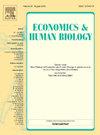Minimum wages and alcohol consumption: Evidence from Canadian longitudinal microdata
IF 1.8
3区 医学
Q2 ECONOMICS
引用次数: 0
Abstract
Objective
The objective is to estimate the effect of provincial minimum wage increases in Canada on heavy drinking, binge drinking and average daily alcohol consumption.
Method
We estimate standard regression models by gender-age group with drinking behaviours as the dependent variables and the minimum wage among the independent variables. We employ the Canadian National Population Health Survey which began in 1994 and ended in 2011, a period comparable to that used by many U.S. studies. The longitudinal feature of the Canadian microdata is an advantage over most U.S. datasets, allowing control for individual fixed effects, including unobserved propensities regarding alcohol. As in U.S. studies, estimation relies on differences in timing and size of minimum wage changes across jurisdictions.
Results
We find no consistent evidence that minimum wage increases increase drinking overall. Indeed, for less-educated males ages 26–64, we estimate that a $1 increase (about 15 %) in the real minimum wage would have reduced the prevalence of heavy drinking by 2.2 percentage points and average daily alcohol consumption by 0.15 standard drinks, with wild bootstrap 95 % confidence intervals (-4.3, −0.1) and (-0.28, −0.07) respectively. Our estimates for females are less consistent but some point towards modest increases in drinking.
Conclusions
Besides our strongest finding of no evidence that minimum wages increase drinking overall, our findings can also be seen as consistent with earlier research on this same Canadian dataset that found minimum wage increases reduced stress in less-educated male workers.
最低工资与酒精消费:来自加拿大纵向微观数据的证据。
目的:目的是估计加拿大各省最低工资增加对酗酒、狂饮和平均每日酒精消费量的影响。方法:以饮酒行为为因变量,以最低工资为自变量,按性别年龄分组估计标准回归模型。我们采用了加拿大国家人口健康调查,该调查开始于1994年,结束于2011年,这一时期与许多美国研究使用的时期相当:加拿大微数据的纵向特征比大多数美国数据集更具优势,允许控制个体固定效应,包括未观察到的酒精倾向。与美国的研究一样,估算依赖于各司法管辖区最低工资变化的时间和规模的差异。结果:我们没有发现一致的证据表明最低工资的增加总体上增加了饮酒。事实上,对于26-64岁的受教育程度较低的男性,我们估计,实际最低工资增加1美元(约15% %)将使酗酒的流行率降低2.2个百分点,平均每日饮酒量减少0.15个标准饮料,其置信区间分别为95 %(-4.3,-0.1)和(-0.28,-0.07)。我们对女性的估计不太一致,但有些人认为饮酒会适度增加。结论:除了我们最有力的发现——没有证据表明最低工资总体上增加了饮酒,我们的发现也可以被视为与早期对同一加拿大数据集的研究一致,该研究发现最低工资的增加减少了受教育程度较低的男性工人的压力。
本文章由计算机程序翻译,如有差异,请以英文原文为准。
求助全文
约1分钟内获得全文
求助全文
来源期刊

Economics & Human Biology
医学-公共卫生、环境卫生与职业卫生
CiteScore
4.50
自引率
12.00%
发文量
85
审稿时长
61 days
期刊介绍:
Economics and Human Biology is devoted to the exploration of the effect of socio-economic processes on human beings as biological organisms. Research covered in this (quarterly) interdisciplinary journal is not bound by temporal or geographic limitations.
 求助内容:
求助内容: 应助结果提醒方式:
应助结果提醒方式:


